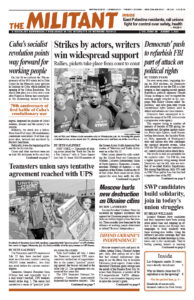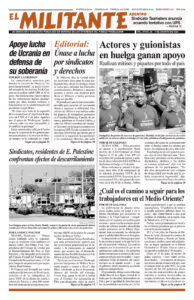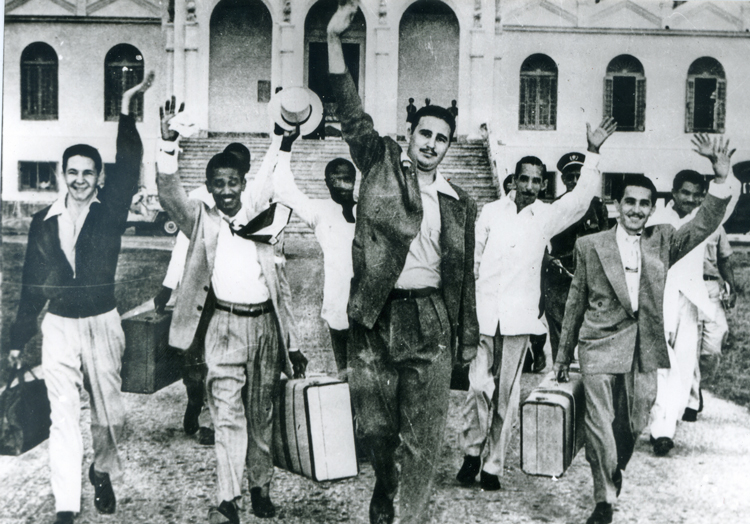On July 26 we celebrate the 70th anniversary of the 1953 attack led by Fidel Castro on the Moncada army garrison in Santiago de Cuba, which marked the opening of the Cuban Revolution. The attack took place just a little over a year after Fulgencio Batista had seized power. His dictatorship, backed by Washington, deepened the plunder of Cuba’s workers, farmers and the country’s resources.
Militarily, the attack was a failure. More than 60 of some 160 revolutionary combatants were killed, 56 of them captured alive, tortured and murdered by Batista’s henchmen.
Politically, it was the beginning of the end for the dictatorship.
Castro and other survivors were put on trial. His testimony to the court was carefully reconstructed, smuggled out of prison and published clandestinely under the title “History Will Absolve Me.” It became the program of the July 26 Movement and tens of thousands of copies were distributed across the island.
Castro and the others were found guilty, but because of the growing outcry by working people, Batista was forced to grant them amnesty and they were released from prison May 15, 1955.
The revolutionary struggle deepened, and on Jan. 1, 1959, Batista fled the country ahead of the advances of the Rebel Army. A week later Castro entered Havana, leading working people determined to implement that program.
Within two years, they had carried out the first socialist revolution in the Americas and inspired a new generation of communist fighters worldwide.
Below, an excerpt from “History Will Absolve Me.” The translation is by Pathfinder Press. Copyright © 2023 by Pathfinder Press. Reprinted by permission.
* * *Why were we sure we could count on the support of the people?
When we speak of the people we aren’t referring to the wealthy and conservative sectors of the nation. We aren’t speaking of those who welcome oppressive regimes, dictatorships, and despotism. We aren’t speaking of those who prostrate themselves before the master of the moment, to the point of pressing their foreheads into the ground.
When we use the term people, we’re referring to the struggle of the great unredeemed masses, those to whom everyone makes promises and everyone deceives and betrays. We’re referring to those who yearn for a better homeland, one with dignity and justice. To those who are moved by age-old aspirations for justice, because they have suffered injustice and been treated with contempt for generation after generation. We’re referring to those who want extensive and sound changes on all levels. To those who are ready — … above all, when they believe in themselves — to give their last drop of blood to attain those changes.
The first condition of sincerity and good faith in any effort is this: to do precisely what no one else does — to speak with absolute clarity and without fear. … Revolutionaries must proclaim their ideas courageously, define their principles, and express their intentions so that no one is deceived — neither friend nor enemy.
When we talk about the people, in terms of struggle, we mean the 600,000 Cubans without work, who want to earn their daily bread honestly without having to emigrate from their homeland in search of a job.
The 500,000 farmworkers who live in miserable huts, who work four months of the year and starve the rest, sharing their poverty with their children; who don’t have an inch of land to till and whose lives would move any heart not made of stone.
The 400,000 industrial workers and laborers whose retirement funds have been embezzled; whose gains won in the past are being taken away; whose homes are hellish shacks that resemble the worst barracks; whose wages pass from the hands of the boss to those of the moneylender; whose future is a cut in pay and loss of a job; whose life is endless toil; whose only rest is the grave.
The 100,000 small farmers who live and die working land that’s not theirs, looking at it with the sadness of Moses gazing at the promised land; who will die without ever owning it; who, like feudal serfs, have to pay for the use of their parcel of land by giving up a portion of what it produces; who cannot love it, improve it, beautify it, nor plant a cedar or an orange tree on it because they never know when an officer of the court will come with the Rural Guard to evict them.
The 30,000 teachers and professors who are so selfless, dedicated, and necessary for a better future for the generations to come — yet are so badly treated and paid.
The 20,000 small merchants, crushed by debt, ruined by the crisis, and dealt the final blow by a plague of thieving, venal officials.
The 10,000 young professionals: doctors, engineers, lawyers, veterinarians, school teachers, dentists, pharmacists, journalists, painters, sculptors, and others who leave school with a degree, looking for a way to fight, full of hope, only to find themselves at a dead end with all doors closed and deaf to their pleas and outrage.
This is the people — those who know misfortune and are therefore capable of fighting with limitless courage! To these people, whose desperate roads through life have been paved with the bricks of betrayal and false promises, we weren’t going to say: “We’ll give you …” but rather: “Now’s the time: Fight with all your strength so that liberty and happiness may be yours!”


